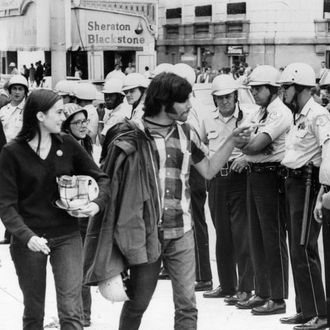
We learn from the Washington Post’s Greg Sargent today that the pro–Hillary Clinton super-pac Priorities USA is already developing ad copy mocking the likely chaos and self-mortification of the Republican National Convention in Cleveland. And it’s true that confab is looking like the kind of ungainly mess that does not inspire confidence in general-election voters that the GOP is ready to govern the country.
But lest Democrats get too cocky about the possible self-destruction of the Republican Party this year, they might need a little history lesson about the time they put on, by all accounts, the wildest and least successful national party convention of the modern era, in 1968.
If there was anything bad that could happen at a convention, it probably happened in Chicago that year. The terrible images are indelible to those who watched it all, up close or on television. There was, of course, the “police riot” (as the quasi-official Walker Report on the violence in Chicago called it), in which anti-war protesters, journalists, and random bystanders were clubbed and tear-gassed by angry po-po showing how not to keep “order.” But inside the convention hall you had furious and poorly resolved credentials and platform fights; goons assaulting TV reporters and delegates deemed unfriendly to “host” Mayor Richard Daley; and Daley mouthing unmistakable anti-Semitic obscenities at a United States senator (Abraham Ribicoff) placing the name of another United States senator (George McGovern) into nomination with a side comment about “Gestapo tactics in the streets of Chicago.” The convention ultimately nominated a candidate who had not won a single primary, and who was restrained by his master, the incumbent president, from differing an iota on the Vietnam War by the threat of entering the contest himself at the very last second.
Worse yet, this disaster occurred at the very end of August, leaving the Humphrey-Muskie ticket very little time to recover. A Gallup poll before Labor Day showed the Democratic ticket pulling only 28 percent of the vote, not a lot more than George Wallace’s 21 percent.
And yet: On Election Day, Humphrey lost the presidency by less than one percent of the popular vote. As Michael Cohen notes in his upcoming book on that election, American Maelstrom, 42,000 votes redistributed in three states would have thrown the election into the U.S. House, where Democrats would have certainly made Humphrey president and consigned Richard Nixon to the dustbin of history as a double loser.
Whatever happens in Cleveland, Republicans this year will have longer to recover than Democrats did in 1968, and a lot more money with which to do battle in the general election. Maybe they’ll be hobbled by the convention and/or by their nominee, and there could be a third-party candidate like Wallace in 1968. But Democrats tempted to get cocky should instead get a grip. Any general election can dramatically tighten just like ’68’s.






























